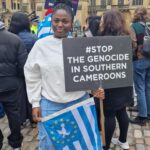CORRUPTION IN CAMEROON UNDER PRESIDENT PAUL BIYA
CORRUPTION IN CAMEROON UNDER PRESIDENT PAUL BIYA
President Biya created the CONAC (National Anti-Corruption Commission) in 2006 in order to actively fight corruption (mainly embezzlement). Indeed, the CONAC has done multiple arrests of top government officials in cases of the embezzlement of astronomical amounts of money. The notable ones being Marafa Hamidou Yaya, former Minister of Territorial Administration and Decentralisation, arrested and convicted for having embezzled US$ 29 million in the case named “presidential jet” by local media, and more recently (March 2019), Edgar Alain Mebe Ngo’o, former Minister of Defence[permanent dead link] arrested on corruption charges with 3 billion FCFA (approx. US$5 million) recovered in cash at his residence, local media reported. These arrests and many others may all seem innocent and driven by Biya‘s goodwill to fight corruption, but Cameroon political analysts and academics see nothing but deception.
Opération Épervier (Operation Sparrowhawk – name given by local media for the seasonal arrests of high government officials convicted for corruption) is merely a way used by President Biya to eliminate his political opponents or officials from his own political party that he thinks have grown to accumulate too much power throughout their career and are starting to become a threat to him. Taking a closer look, Marafa Hamidou and Edgar Alain Mebe have both been very close to President Biya and have both worked as secretary general to the presidency of Cameroon – a post that keeps you very close to the president. Both of them have held important positions in the government, positions that allow them to forge strategic networks and relations (both national and international) should they decide to run for presidency. President Biya’s strategy is to allow those close to him to embezzle and later on use it against them when he feels they become a threat. This further reinforces the idea that there is no real/genuine will to combat corruption. In addition, it is an opportunity for Biya’s regime to create an illusion of democracy and transparency as it has done in the past, more recently with the blatant use of sham Transparency International observers during the presidential elections of October 2018. During this election no voting took place in the Southern and Northern Regions of the country ,but it was declared he won the elections there .
David Wallechinsky ranked President of Cameroon Paul Biya with three others (Robert Mugabe of Zimbabwe of blessed memory Teodoro Obiang Nguema Mbasogo of Equatorial Guinea, and King Mswati of Swaziland) as the most corrupt dictators in the world. He describes Cameroon’s electoral process in these terms: “Every few years, Biya stages an election to justify his continuing reign, but these elections have no credibility.
Written By: Emilia Efeti Agey

